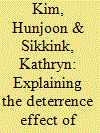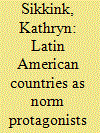|
|
|
Sort Order |
|
|
|
Items / Page
|
|
|
|
|
|
|
| Srl | Item |
| 1 |
ID:
164463


|
|
|
|
|
| Summary/Abstract |
Following the attacks of 9/11, the United States adopted a policy of torturing suspected terrorists and reinterpreted its legal obligations so that it could argue that this policy was lawful. This article investigates the impact of these actions by the United States on the global norm against torture. After conceptualizing how the United States contested the norm against torture, the article explores how US actions impacted the norm across four dimensions of robustness: concordance with the norm, third-party reactions to norm violations, compliance, and implementation. This analysis reveals a heterogeneous impact of US contestation: while US policies did not impact global human rights trends, it did shape the behavior of states that aided and abetted US torture policies, especially those lacking strong domestic legal structures. The article sheds light on the circumstances under which powerful states can shape the robustness of global norms.
|
|
|
|
|
|
|
|
|
|
|
|
|
|
|
|
| 2 |
ID:
101613


|
|
|
|
|
| Publication |
2010.
|
| Summary/Abstract |
Human rights prosecutions have been the major policy innovation of the late twentieth century designed to address human rights violations. The main justification for such prosecutions is that sanctions are necessary to deter future violations. In this article, we use our new data set on domestic and international human rights prosecutions in 100 transitional countries to explore whether prosecuting human rights violations can decrease repression. We find that human rights prosecutions after transition lead to improvements in human rights protection, and that human rights prosecutions have a deterrence impact beyond the confines of the single country. We also explore the mechanisms through which prosecutions lead to improvements in human rights. We argue that impact of prosecutions is the result of both normative pressures and material punishment and provide support for this argument with a comparison of the impact of prosecutions and truth commissions, which do not involve material punishment.
|
|
|
|
|
|
|
|
|
|
|
|
|
|
|
|
| 3 |
ID:
078638


|
|
|
|
|
| Publication |
2007.
|
| Summary/Abstract |
Since the 1980s, states have been increasingly addressing past human rights violations using multiple transitional justice mechanisms including domestic and international human rights trials. In the mid-1980s, scholars of transitions to democracy generally concluded that trials for past human rights violations were politically untenable and likely to undermine new democracies. More recently, some international relations experts have echoed the pessimistic claims of the early `trial skeptics' and added new concerns about the impact of trials. Yet, relatively little multicountry empirical work has been done to test such claims, in part because no database on trials was available. The authors have created a new dataset of two main transitional justice mechanisms: truth commissions and trials for past human rights violations. With the new data, they document the emergence and dramatic growth of the use of truth commissions and domestic, foreign, and international human rights trials in the world. The authors then explore the impact that human rights trials have on human rights, conflict, democracy, and rule of law in Latin America. Their analysis suggests that the pessimistic claims of skeptics that human rights trials threaten democracy, increase human rights violations, and exacerbate conflict are not supported by empirical evidence from Latin America
|
|
|
|
|
|
|
|
|
|
|
|
|
|
|
|
| 4 |
ID:
118447


|
|
|
|
|
| Publication |
New York, W W Norton and Company, 2011.
|
| Description |
viii, 342p.hbk
|
| Standard Number |
9780393079937
|
|
|
|
|
|
|
|
|
|
|
|
Copies: C:1/I:0,R:0,Q:0
Circulation
| Accession# | Call# | Current Location | Status | Policy | Location |
| 057084 | 345.0235/SIK 057084 | Main | On Shelf | General | |
|
|
|
|
| 5 |
ID:
133477


|
|
|
|
|
| Publication |
2014.
|
| Summary/Abstract |
Latin American governments, social movements, and regional organizations have made a far greater contribution to the idea and practice of international human rights than has previously been recognized. Most discussions of the global human rights regime stress its origins in the countries of the Global North. This article explores the role of Latin America states as early protagonists of the international protection of human rights, focusing in particular on the American Declaration of the Rights and Duties of Man. Histories of human rights in the world emphasize the Universal Declaration of Human Rights, passed by the UN General Assembly on 10 December 1948, as the founding moment of international human rights. Few know that Latin American states passed a similar American Declaration of the Rights and Duties of Man a full eight months before passage of the UDHR. The American Declaration thus was the first broad enumeration of rights adopted by an intergovernmental organization. This article explores the American Declaration as an example of often overlooked Latin American human rights protagonism that has continued to this day, and that calls into question the idea that human rights originated in only the Global North.
|
|
|
|
|
|
|
|
|
|
|
|
|
|
|
|
| 6 |
ID:
048048


|
|
|
|
|
| Publication |
Cambridge, Cambridge University Press, 2000.
|
| Description |
xii, 318p.
|
| Series |
Cambridge studies in international relations
|
| Standard Number |
0521658829
|
|
|
|
|
|
|
|
|
|
|
|
Copies: C:1/I:0,R:0,Q:0
Circulation
| Accession# | Call# | Current Location | Status | Policy | Location |
| 043468 | 323/RIS 043468 | Main | On Shelf | General | |
|
|
|
|
|
|
|
|
|